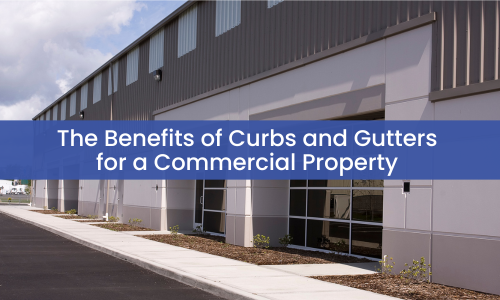Curbs and gutters may not seem like top priorities during commercial development, but they should be. Concrete curb and gutter systems are vital pieces of construction, providing several advantages that add value to every commercial property.
How can curbs and gutters make such a big difference? Here are five reasons why future-minded property owners invest in their own concrete curb and gutter construction:
1) Curb and Gutter Systems Ensure Adequate Drainage and Protect Against Erosion
Water is life, but too much water is a problem. If drainage is inadequate, water damage can reduce the structural integrity of buildings and invite pests in. Standing water will also soak into the soil, causing it to shift and put any nearby foundation at risk.
In flat, rainy areas like those along the Gulf Coast, commercial properties need well-formed curb and gutter systems to drain storm runoff. Concrete used for this purpose is treated so that it’s water resistant, so it can be used to form a variety of drainage structures, including curbs, gutters, catch basins, culverts, trench drains and more.
When properly formed and installed, curbs and gutters ensure properties dry out faster and maintain soil health by minimizing erosion. This includes pavement erosion, too, because water can eat away at asphalt and untreated concrete. By preventing standing water, curb and gutter systems protect your parking lots, sidewalks, and other parts of your pavement investment.
2) Curbs and Gutters Reinforce the Pavement’s Edges
Roads and parking lots look like they should stay put after installation, but without adequate support, they are more likely to take on damage and fail when exposed to weight-related stresses. This is most notable at the pavement’s edge, where a lack of support will first be seen as severe cracks or warping.
Curbs are like the spine for a stretch of pavement. They anchor the pavement’s edges in place and help absorb some of the loadbearing force from vehicles and other stressors. Investing in a curb is investing in the pavement’s long-term durability.
In this way, curb and gutter systems offset their own cost by extending the pavement’s lifespan.
3) A Curb and Gutter System Improves Pedestrian and Motorist Safety
Curbs and gutters not only protect pavement, they also protect nearby pedestrians and motorists. A curb acts like a barrier between the road and sidewalk. It provides visual and physical feedback when crossed, for both pedestrians and drivers. In today’s often-distracted society, curbs can save many pedestrians from walking straight into danger without realizing it. They are also effective at keeping motorists from careening off the road while being distracted.
Commercial property owners are heavily incentivized to keep their parking lots and roads as safe as possible. Any accident may cause serious liability issues, and it’s not good for a company’s reputation if it is associated with poor safety measures.
Quality curb and gutter construction will maintain that necessary sharp boundary between road and walkway, improving safety for all types of traffic.
4) Curbs and Gutters Improve Traffic Flow Through a Parking Lot or Access Road
Improved traffic flow can also support better safety on commercial properties. Whether it’s a parking lot, an access road or just a patch of pavement designed for vehicle traffic, curbs help establish their boundaries. Curbs define the pavement’s area and help motorists visualize their way through it. Curbs keep motorists from driving off the property and causing confusion. Curbs can also be painted for better visibility or to help mark out parking spots. This is helpful for pointing out loading areas, no parking areas, or fire lanes.
Put it all together and it’s clear that curbs offer better traffic flow and a safety advantage for commercial property owners.
5) A Curb and Gutter System Boosts a Commercial Property’s Curb Appeal
And since we’re talking about curbs, it’s a good time to mention curb appeal. Although you wouldn’t call them aesthetically critical, curbs improve a property’s appearance, or at least prevent a property from looking run down.
Curbs create nice, sharp lines that give order to a commercial property and support a well-maintained appearance. You may not give them much consideration when they’re present, but when curbs are left out of a pavement project, people will notice. Without that clean division provided by curbs, commercial properties may take on a haphazard, sloppy look, which is not an ideal first impression for businesses.
Curbs and Gutters are Versatile Structures That Can Serve a Multifunctional Role for Commercial Properties
Along the Gulf Coast, wet conditions prevail, so runoff control in the form of proper drainage is vital. As essential drainage structures, curb and gutter systems are the first line in flood defense and are therefore critical investments for commercial property owners.
But curbs and gutters offer more. They’re edge reinforcers, important safety features, traffic improvers, and aesthetic boosters. In short, they add value to commercial properties in several ways, and are therefore an essential part of any large-scale commercial development.
- HOA & Condos – How Asphalt Pavement Can Affect Your Houston Property Values - March 6, 2025
- What Certifications or Licenses Should a Houston Asphalt Contractor Have? - September 17, 2024
- Common Challenges in Concrete Construction - September 11, 2024

